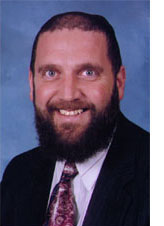By Rabbi Baruch Lederman

SAN DIEGO–The Torah instructs us to find judges that are of flawless sterling character. One great trait is humility, gained as a result of compassionate human insight, as the
following true story, told by Dr. Isaac Steven Herschkopf, an attending psychiatrist at the NYU Medical Center, illustrates:
Rabbi Moshe Feinstein, the gadol hador, the greatest sage of his generation, was so renowned he was referred to simply as “Reb Moshe.” Every Rabbi would speak of Reb
Moshe in awe-stricken tones usually reserved for biblical forefathers.
One summer I was spending a week with my aunt and uncle in upstate Ellenville. Uncle David and Aunt Saba, survivors themselves, as the doctor and nurse in charge of the concentration camp infirmary, had managed to save the lives of innumerable inmates, including my mother and sister. After “the War” they had set up a medical practice in this
small Catskill village, where, I discovered, to my amazement, they had one celebrity patient – Reb Moshe.
My aunt mentioned casually that Reb Moshe had an appointment the next day. Would I like to meet him? Would I? It was like asking me, would I like to meet Moses.
I couldn’t sleep that night. I agonized over what I should wear. Should I approach him? What should I say? Should I speak to him in English, or my rudimentary Yiddish?
I was seated in the waiting room, in the best clothing I had with me, an hour before his appointment. It seemed like an eternity, but eventually he arrived, accompanied by an assistant at each side. He didn’t notice me.
I was frozen. I had intended to rise deferentially when he entered, but I didn’t. I had prepared a few sentences that I had repeatedly memorized, but I sensed that my heart was beating too quickly for me to speak calmly.
My aunt had heard the chime when he entered and came out of the office to greet him: “Rabbi Feinstein, did you meet my nephew Ikey? Can you believe a shaygitz [unobservant] like me has a yeshiva bochur [student] in the family?”
Reb Moshe finally looked at me. I was mortified. My aunt was addressing him irreverently. She was joking with him. She had called me Ikey, not Yitzchok, or even Isaac.
Then it got even worse. She walked over to him. Surely she knew not to shake his hand. She didn’t. She kissed him affectionately on the cheek as she did many of her favorite patients. She then told him my uncle would see him in a minute and returned to the office.
Reb Moshe and his attendants turned and looked at me, I thought accusingly. I wanted to die. In a panic, I walked over to him and started to apologize profusely: “Rabbi Feinstein, I apologize. My aunt, she isn’t frum [religious]. She doesn’t understand…”
He immediately placed his fingers on my lips to stop me from talking. He then softly spoke two sentences in Yiddish that I will remember to my dying day: “She has numbers on her arms. She is holier than me.”
*
Rabbi Lederman is spiritual leader of Congregation Kehillas Torah in San Diego